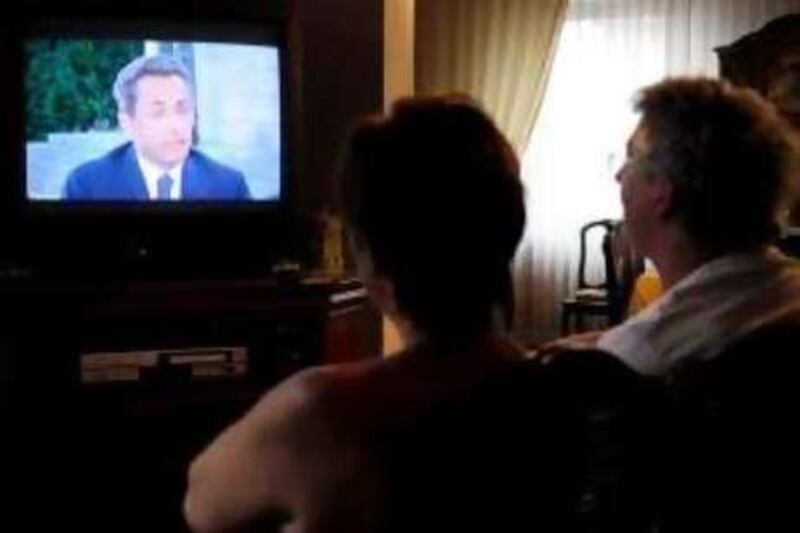PARIS // Nicolas Sarkozy's approval rating has sunk to the lowest level of his three-year French presidency as he fights to shake off allegations of sleaze arising from the complex financial affairs of France's richest woman. With public dismay highlighted by a poll suggesting nearly two thirds of French people regard their political leaders as "mostly corrupt", Mr Sarkozy went on peak-time television to denounce claims that he had received illegal donations towards his 2007 campaign for the Elysée.
In a solemn interview on state-run France 2, the president condemned as "slander and lies" a suggestion that he received ?150,000 (Dh690,000) in cash, stuffed in an envelope, during a visit to the home of Liliane Bettencourt, the 87-year-old billionaire heiress to the L'Oréal cosmetics empire. "The idea that I went to Mme Bettencourt to get money in envelopes ? it's shameful," Mr Sarkozy said, pointing out that a long-serving employee at Mrs Bettencourt's home had recalled seeing him there only twice or three times in 17 years. "Do you imagine I left each time with money?"
But with police and prosecution officials investigating separate aspects of the affair, there is little reason to suppose that this classically French scandal is about to go away. Immediate reaction divided along political lines. Supporters of Mr Sarkozy's centre-right government hailed his forthright rejection of "disgraceful smears", but critics on the Left accused him of ignoring the legitimate concerns of the French.
The stream of claims and counter-claims is an unwelcome distraction to Mr Sarkozy and his labour minister, Eric Woerth, as they attempt to persuade France to accept unpopular pensions reform. Plans to extend the retirement age from 60 to 62 went before the French cabinet yesterday. They have already provoked strikes and demonstrations, and these are likely to intensify in the coming months. Polls in the past few days have put the president's approval rating at 30 per cent and 33 per cent, the lowest levels since he took office in 2007.
Mr Woerth has also been caught up in the Bettencourt affair. His wife resigned recently as an adviser to the family's wealth management company, a job she held while her husband was budget minister, and Mr Woerth was subjected to a series of accusations before finally being cleared, in a report by tax inspectors on Monday, of interference in the Bettencourts' fiscal dealings. In his television interview, the president described his minister as a "deeply honest man" who had suffered as a result of false accusations. However, he also said Mr Woerth should now stand down from his parallel role as treasurer of the ruling UMP party; the minister confirmed yesterday he would do so.
The source of allegations about illegal campaign donations was Claire Thibout, a former bookkeeper for the Bettencourts, in an interview with the news website Mediapart. Although she has subsequently said she was misquoted, and insists she never saw money handed to the president, she has not retracted an allegation that Mr Woerth received a cash donation towards Mr Sarkozy's 2007 campaign. Mr Woerth has also defended himself on television. "I did not receive a single euro illegally for the campaign," he said.
Mrs Bettencourt's finances have been under scrutiny since her only daughter, Françoise, questioned gifts approaching Dh5 billion allegedly made by her mother to a society photographer, François-Marie Banier. According to her daughter, Mrs Bettencourt is not mentally fit to make financial decisions. Mr Banier is being tried for "abuse of weakness", which he denies, and the case has drawn attention to the Bettencourts' tax affairs, which are now the subject of a separate investigation.
France has long had a reputation for kickbacks, illegal funding and abuses of power in public life. Last week, two ministers resigned; one had been criticised for using Dh55,000 of public money to buy Cuban cigars, the other had hired a private jet for Dh550,000 to attend an aid conference, held in Martinique, on the Haiti earthquake. Mr Sarkozy denied that France was a corrupt country but said it was necessary to "put an end to these bad habits".
@Email:crandall@thenational.ae







